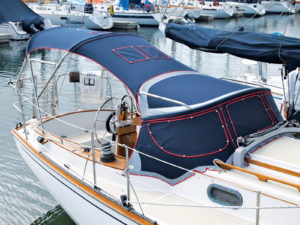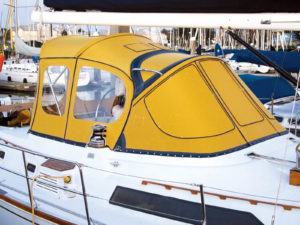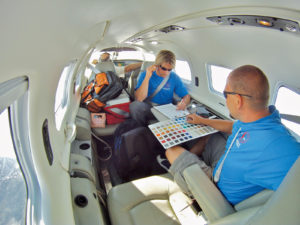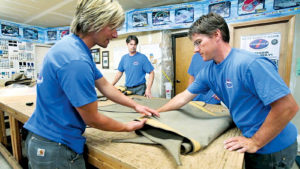Standardizing dodger design and fabrication

When designing each dodger, Iverson’s Design considers the uniqueness of each sailboat. Clients specify the height they want and how far back into the cockpit they want the dodger to extend. They also choose from a variety of colors and materials.
Jason Iverson is passionate about his business. It is obvious when he talks about the details of his designs and how he works with his customers. He has been able to combine two of his passions—product design and sailing—to launch Iverson’s Design Inc., a successful business designing dodgers and accessories for sailboats.
“When you are passionate about something it is a given you will succeed,” Iverson said. “This business is not just a job, it is my life.”
Iverson likes to make business fun, too. The “extreme product tests” featured on his company website include videos of him getting in a front-end loader and dumping 600 gallons of water on a dodger for a wave test, and conducting a wind test by racing his product down an airport runway at 90 miles an hour.
Iverson got involved in the upholstery business early. His first job at 15 was sweeping floors after school at an upholstery shop in his hometown of Centralia, Wash. After a while, he told his boss he wanted to try selling and patterning. His boss gave him the chance, and Iverson discovered he was good at it and enjoyed it. “Once you are an upholsterer, you are always an upholsterer,” he said.

Jason Iverson started Iverson’s Design Inc. and created the i-Top dodger to combine the benefits of standardized design with the flexibility and responsiveness that the customers demand. Photo: Iverson’s Design Inc.
After high school, Iverson went to the University of Washington in Seattle where he pursued his interest in design and earned a bachelor of arts degree in industrial design, along with a bachelor of fine arts in interdisciplinary visual arts. During school, he continued to work in several different upholstery shops and lived his other passion—his home during those years was a sailboat on Lake Union and Puget Sound.
At the time, however, he really wasn’t thinking about making anything to do with sailing or upholstery his life’s work. Iverson assumed that like many college grads, he’d find a job with a corporation once school was over. But as he interviewed for jobs, he assessed what he really wanted in life and realized the artist in him didn’t want to spend his days in a cubicle. He wanted to be his own boss and he wanted to create his own product.
If you build it, they will come

Jason Iverson and his crew travel nationwide to accommodate customer needs. “The key to our success is our reputation,” he says.
Now Iverson’s passions for design and sailing came together. He explored a number of possibilities for the product he wanted to create. Through his years working in upholstery shops, Iverson saw an opportunity to design dodgers. He thought by taking advantage of manufacturing efficiencies not traditionally used in marine fabrication, he could manufacture a high-quality product by standardizing it. Iverson also understood what would be appealing to consumers—in short, he felt he could build a better dodger and set out to do just that.
Working in his garage, Iverson did a lot of drafting and prototyping until he created his signature product, the i-Top dodger, a proprietary design protected by law. The design combines a modular canvas soft top with a framing structure to create a dodger that protects from the elements with style. He founded his company, Iverson’s Design Inc. in 2000.
Design combines form and function
 When designing each dodger, Iverson’s Design considers the uniqueness of the individual sailboat. Clients specify the height they want and how far back into the cockpit they want the dodger to extend. They also choose from a variety of colors and material choices.
When designing each dodger, Iverson’s Design considers the uniqueness of the individual sailboat. Clients specify the height they want and how far back into the cockpit they want the dodger to extend. They also choose from a variety of colors and material choices.
Specific details, like the sailboat’s style and lines, are incorporated into the dodger to compliment the boat. “Our dodgers are highly serviceable, but they are also works of art,” Iverson said. “The beauty of our products is in the balance we strike between functionality, style, comfort and safety.”
The frame design utilizes compression and tension to counterbalance forces inflicted on it, enhancing its structural integrity. It is connected to the deck with hinge points that pivot to absorb any flex or shock to the canvas dodger and reduce sheer on these connecting points. It is designed to be more aerodynamic to reduce windage and add to the structural integrity of the frame.
The tensioned canvas skin on the i-Top is an integral component of the structure and its flexibility helps reduce or cushion the initial impact of a force such as a wave or wind.
The rigid nature of the i-Top’s windows creates a distortion-free and wrinkle-free appearance with the clarity of glass. They are made of 60 mil., aircraft-grade UV/scratch-resistant polycarbonate window material. The windows wear well, remaining dimensionally stable with exposure to solar heat. The window configuration provides a greater wrap-around view from the helm.
Iverson says the fact that his company is not a custom canvas shop sets it apart from the competition. “We do one thing well,” he says. Iverson has won awards for his designs regionally, nationally and internationally, including awards from the Industrial Fabrics Association International.
His business model has standardized his company’s processes to the point that he and his staff are able to travel nationwide to provide the product. Their normal service area is Washington, Oregon and California, but they have customers as far away as Miami and Lake Michigan.
It also has enabled his company to provide exceptional customer service, something that Iverson feels is essential to his company’s success. “The key to our success is our reputation. Our customers’ experience needs to be something more than they expect,” said Iverson.
That experience includes every contact from the initial phone call to the point when the product is delivered. Customers can begin by using the company’s extensive website where all the details of manufacturing each dodger are explained, along with options for color choices, frames and accessories.
Iverson’s Design uses expert teams to complete each task in the process: A road crew specializes in the design and patterning of a project, a layout team prepares the patterns, and a sewing team stitches together the canvas top. If welding is necessary for the project, a welding team is on the job. Unless there are issues with the scope of the project or the weather, installation generally takes place within two weeks of the initial consultation.
“It’s really about building trust. We do what we say we will do and we keep our customers in the loop,” said Iverson. “The sailboat industry is a culture,” he explained. “When people like your work, word spreads through conversations, online and through social media.”
Julie Swiler is a freelance writer from St. Paul, Minn.
 TEXTILES.ORG
TEXTILES.ORG 



